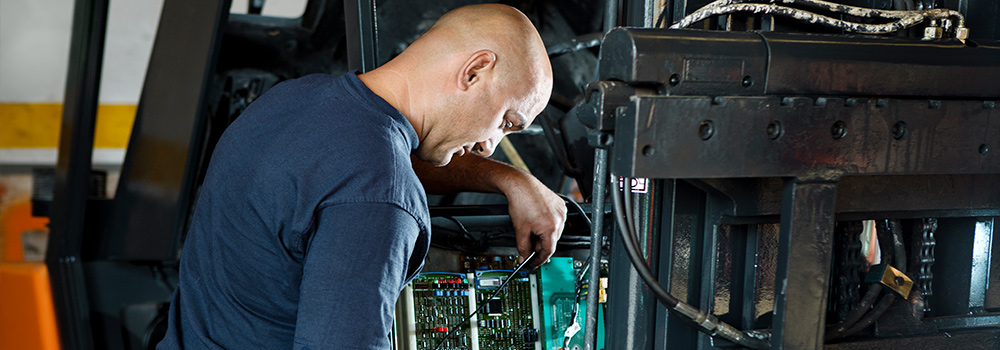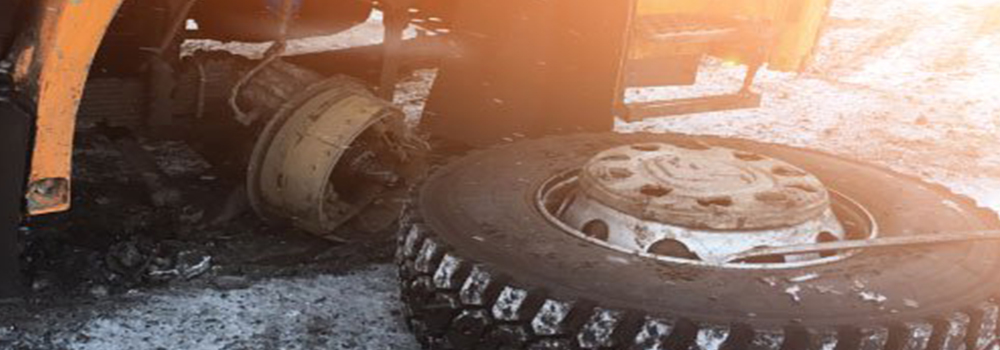Summary
- Learn about the top things you should look for when buying a forklift
- Discover the factors that affect a forklift’s quality and value
- Find out what makes a forklift high quality
Forklift trucks are essential for operations in warehouses and fulfilment centres. However, all businesses need to keep outgoings low where they can, and it is often more cost-effective to buy a used electric forklift rather than purchasing a brand new model or opting for a forklift lease.
A secondhand forklift is a great option for businesses with short operational hours, or for companies who simply want to make some cost savings. Whatever type of forklift you require, and whatever your reasons for choosing secondhand forklift trucks, here are some pointers that should help you and your forklift operators choose the right forklift model for your business needs at a cheaper purchase price.
1. Maintenance history

Service history is incredibly important when seeking out forklifts for sale. With a detailed maintenance and repair history, you’ll be able to ascertain whether the vehicle has had any excessive wear or major issues.
When browsing the secondhand forklift market, be wary of gaps in history. A reputable forklift dealer should be able to provide you with a full maintenance history including details of any previous repair issues.
In addition to maintenance history, you should also request a Certificate of Thorough Examination. This certificate ensures that the forklift in question is compliant with current regulations. It is a legal requirement to provide you with this document, so be wary if a potential disreputable dealer refuses to provide you with one.
2. Mileage
The amount of mileage a secondhand forklift has travelled is usually a good indicator of its condition. However, depending on fuel type, the forklift may not have a mileometer. In fact, most forklift brands don’t as standard. Instead, forklift experts tend to measure the “age” of a forklift by the number of hours it has been in use, as opposed to the number of miles it has put in.
On the assumption that a forklift is in use over the course of an eight-hour work day, the average battery will put in some 2,000 hours per year. Of course, this doesn’t mean a forklift that has put the hours will necessarily be in bad condition. For example, a unit that has been used sparingly but on difficult terrain might be in worse condition than a device used five days a week on a flat indoor surface.
Battery age isn’t necessarily an indicator of a well-worn forklift, either. A dead battery can be replaced with a new one – but it’s worth considering if there are any other signs of wear. A cheap forklift might be low-priced for a reason, and that reason could be that it has put in the miles and is starting to deteriorate.
3. MOT/annual check
In the UK, the Health and Safety at Work Act (1974) stipulates that forklifts should undergo an MOT every twelve months. In addition to this, it’s good practice for businesses to keep a Daily Forklift Safety Checklist. A reputable dealer should be happy for you to see any forklift operators’ documentation pertaining to the vehicle you are interested in purchasing. This will allow you to buy with confidence.
4. Country of origin
An imported forklift could potentially help you to save money. However, approved forklift trucks need to have the correct certification. European safety directives require CE certification, and if you purchase an additional forklift from outside of the UK or the European Union, it might not be certified for use in this country. It may be helpful to speak to a forklift authority who can help clarify the choice of models which are suitable for UK use.
5. Damage and dents

It is crucial that you and/or your forklift operators inspect all working parts of a vehicle before committing to a purchase. The last thing you want is to buy a unit only to have to pay further on expensive forklift repairs. Regardless of the types of forklifts you use, you should be on the lookout for the following when performing an effective forklift truck inspection:
Forks and mast
When beginning your inspection, start at the front of the vehicle. Be on the lookout for any bends, cracks or signs of wear on the forklift forks, mast rails and mast rollers. Cracks are the most worrisome, as they are a clear sign that the forklift forks will need replacing soon.
Lift chains
After inspecting the forks, move up the mast to see if you can spot any gaps in the lift chains. You should also be on the lookout for any welding marks that suggest the lift chains have previously been repaired.
Engine
If you’re purchasing a diesel forklift, you’ll want to know what condition the engine is in. Don’t be afraid to let a diesel engine forklift run for a few minutes before taking a look inside the engine compartment. You should be on the lookout for any cracks or leaks on the hoses.
Leaks
If you are inspecting a diesel vehicle, remove the dipstick to check on the oil level. Low oil levels could suggest there is a leak in the engine. You should also check the brakes, transmission fluid, mast cylinders and radiator for any potential leaks.
6. Reputation of the seller
Be wary of unscrupulous sellers, particularly on online auction sites or social media marketplaces. Instead, you should only purchase from a reputable dealer with a proven track record, a history of positive online reviews, and after-sales service as standard.
7. Warranty details
A reputable and trustworthy secondhand forklift seller will be able to provide all relevant documentation and certification in addition to a warranty which covers parts and labour. This way, you can purchase with confidence, safe in the knowledge that your used forklift is in good condition and will stand you in good stead for years to come.
Conclusion
Buying a used forklift is a great way to expand your business fleet and carrying capacity. By using the information above, you should be able to assess whether a particular model is suitable for the needs of your company. This will hopefully prevent you from making a bad investment and will ensure your forklift operators only use high-quality, well-maintained equipment.
Interested in buying a used forklift in your local area? Simply enter your requirements and we’ll connect you with the best deals from local dealers! Search for used forklift deals.